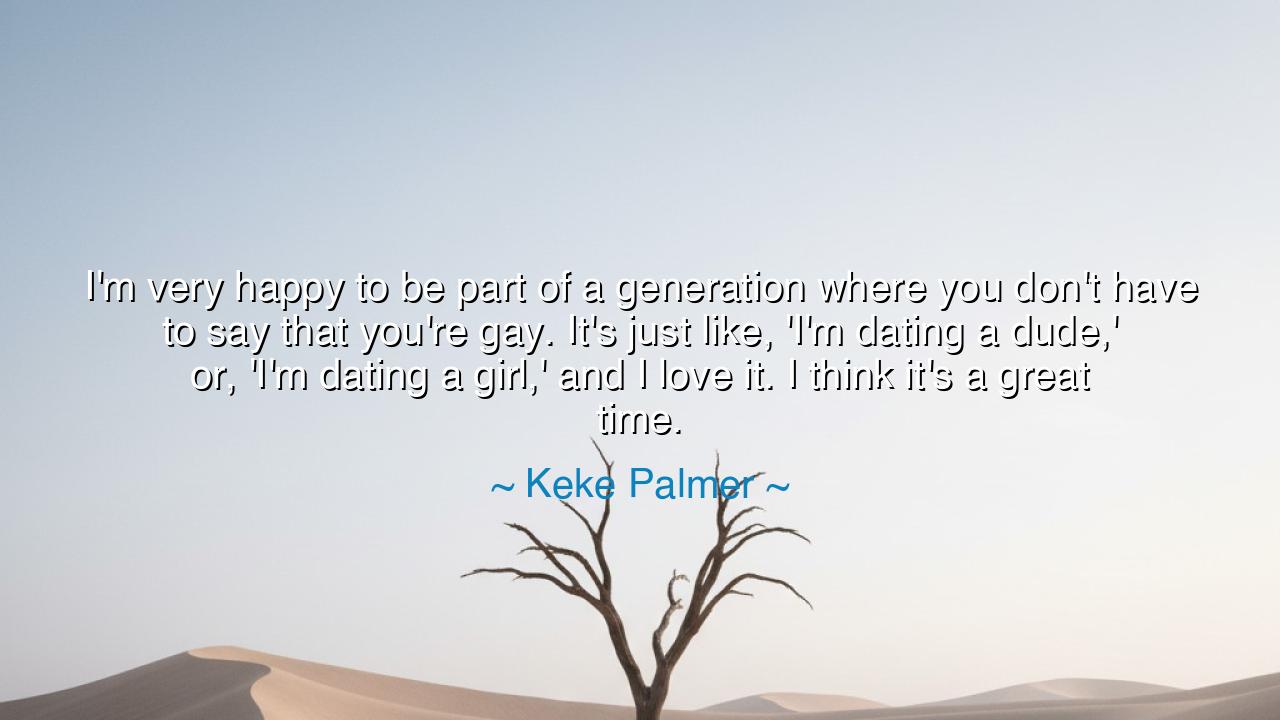
I'm very happy to be part of a generation where you don't have to
I'm very happy to be part of a generation where you don't have to say that you're gay. It's just like, 'I'm dating a dude,' or, 'I'm dating a girl,' and I love it. I think it's a great time.






In the words of Keke Palmer, a voice radiant with courage and compassion, we hear the joyful sigh of a generation awakening into freedom: “I'm very happy to be part of a generation where you don't have to say that you're gay. It's just like, 'I'm dating a dude,' or, 'I'm dating a girl,' and I love it. I think it's a great time.” These are not the words of one merely celebrating romance, but of one recognizing a profound transformation in the human spirit — the liberation of identity from fear, from definition, from the chains of judgment. Hers is a declaration of peace — the peace that comes when people no longer have to justify who they love.
In the ancient world, the poets and philosophers spoke often of love as the force that binds the cosmos together. Plato, in his Symposium, wrote that love is not governed by law or reason; it is the divine spark that drives creation itself. Yet, for centuries, humanity sought to control that spark, to bind it in names, to divide it by rules. Many were cast out, silenced, or forced into shadows simply because their hearts dared to beat outside the accepted rhythm. Palmer’s words stand as a triumph over that darkness — the dawn of a time when love, in all its forms, may at last walk openly beneath the sun.
Her joy — “you don’t have to say that you’re gay” — carries within it the weight of centuries. To earlier generations, such a sentence would have sounded like a dream too fragile to believe. It recalls the struggles of those who lived when love itself was forbidden. Think of Oscar Wilde, the poet whose brilliance illuminated the world yet whose love brought him ruin. In his final letter, De Profundis, written from prison, Wilde spoke of suffering as his teacher and of love as his salvation, even amid shame. What Keke Palmer celebrates, Wilde was punished for — yet it is through the courage of souls like his that this freedom was built. Her laughter is the echo of their endurance, her ease the fruit of their pain.
But beyond celebration, there is also wisdom in her words. When she says, “It’s just like, ‘I’m dating a dude,’ or, ‘I’m dating a girl,’” she speaks of the normalization of love — the dissolving of boundaries that once separated the human heart from its truth. In the old ways of thinking, identity was a declaration, a statement of difference. Now, she envisions a world where love simply is. The ancients would have called this wholeness — the return to harmony after division. It is the same unity that the philosopher Heraclitus described when he said, “Out of discord comes the fairest harmony.” From the discord of centuries of judgment now emerges the song of equality.
Palmer’s words remind us that progress is not just political but spiritual. To live in a time when love needs no explanation is to dwell closer to truth. The walls between labels crumble, and in their place rises the understanding that all affection, all connection, is sacred when born of respect and kindness. Her gratitude is not naïve — it is reverent. She knows that freedom is never given lightly, but won through struggle. To rejoice in it is to honor those who came before, and to safeguard it for those who will come after.
The lesson, then, is simple yet eternal: let love be love. Do not define it, confine it, or weigh it against tradition. To love honestly is to live in accordance with the divine nature of the soul. The wise of every age have said that the heart must be free if humanity is to flourish. In your own life, practice this freedom not only in romance but in every act of acceptance. See others not as different, but as mirrors of the same flame — each shining in its own hue, yet part of the same fire.
And so, let Keke Palmer’s words echo as a hymn for the new age: rejoice that we live in a time when love can breathe without fear. But do not grow complacent — for freedom must be tended like a garden, protected by empathy and watered with courage. Celebrate this “great time,” as she calls it, by ensuring that all may share in it. For when every person, in every corner of the world, can say “I love” without apology, then humanity will have fulfilled one of its oldest and most sacred destinies — the triumph of truth over fear, and of love over judgment.






AAdministratorAdministrator
Welcome, honored guests. Please leave a comment, we will respond soon